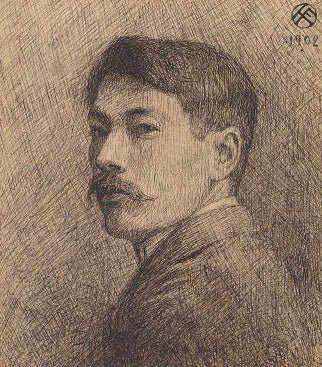Description
The work "Self-Portrait - 1902" by Fujishima Takeji is a fascinating example of the intersection between Japanese artistic heritage and the influence of Western modernism in the late 19th and early 20th centuries. This self-portrait not only reveals Fujishima's technical skill but also offers a window into his inner world and his perception of art at a time of cultural transformation in Japan.
Upon observing the painting, the viewer is faced with a balanced composition, where the figure of the artist is presented in the foreground, radiating introspection and self-knowledge. The choice of a dark background highlights the main figure, focusing our attention on Fujishima's facial features, which are represented with subtle realism. The color technique is remarkable: the skin tones evoke a sense of warmth and humanity, contrasting with the use of cooler and darker colors in the background, which may reflect a struggle between the artist's individuality and the broader social and cultural context.
Fujishima combines elements of traditional Japanese painting with the influence of European painting, evident in his attention to detail and his ability to capture light and shadow in an almost impassive manner. The color nuances he uses in the hair and face provide a sense of three-dimensionality that invites the viewer to look beyond the surface. The expression on his face is serene but also shows a mix of contemplation and melancholy, which may reflect the search for identity in a country undergoing rapid modernization.
An interesting aspect of this work is how Fujishima presents himself in an intimate style, surrounded by elements that suggest his personal and professional environment. Although there are no additional characters, the author's clothing, with his keikogi, suggests a respect for tradition and an acknowledgment of his cultural roots. This element reinforces the idea that although Fujishima was influenced by the modern currents of the time, he still remains anchored to his traditions.
Fujishima Takeji, born in 1866 and died in 1942, was a pioneer in the introduction of oil painting techniques in Japan, a country that had long favored ink and watercolor techniques. His experiences and studies abroad positioned him as a bridge between two worlds. "Self-Portrait - 1902" is a representation of this crossroads, showing the transformation of artistic identity in a Japan that was entering the 20th century.
This self-portrait is framed within a broader context of portrait practice in the history of Japanese art, which often celebrates individuality while examining how the artist sees himself within his cultural environment. The work is a testament not only to Fujishima's skill but also to his deep reflection on identity, culture, and art during a period of tumultuous change.
In conclusion, "Self-Portrait - 1902" by Fujishima Takeji is more than a visual representation of the artist; it is a reflection of his time, a dialogue between tradition and modernity, and an exploration of the self within an evolving world. The painting continues to resonate with contemporary viewers, inviting them to consider how individual identity is forged and reconfigured in the crucible of history and culture. This work not only captures the essence of its creator but also relates personal experience to the broad cultural fabric of its era, a perpetual reminder of the complexity of the human condition.
KUADROS ©, a famous painting on your wall.
Hand-made oil painting reproductions, with the quality of professional artists and the distinctive mark of KUADROS ©.
Reproduction service of paintings with a satisfaction guarantee. If you are not completely satisfied with the replica of your painting, we will refund 100% of your money.

